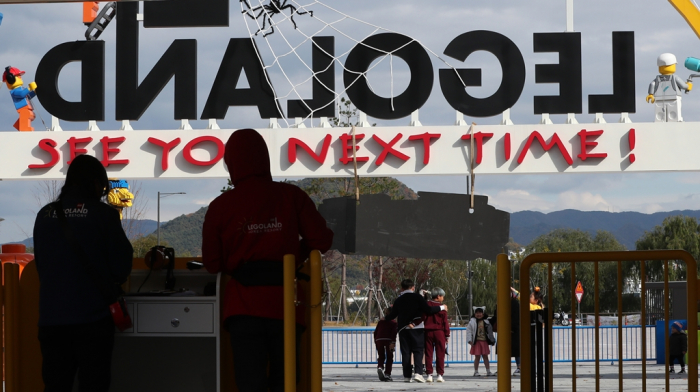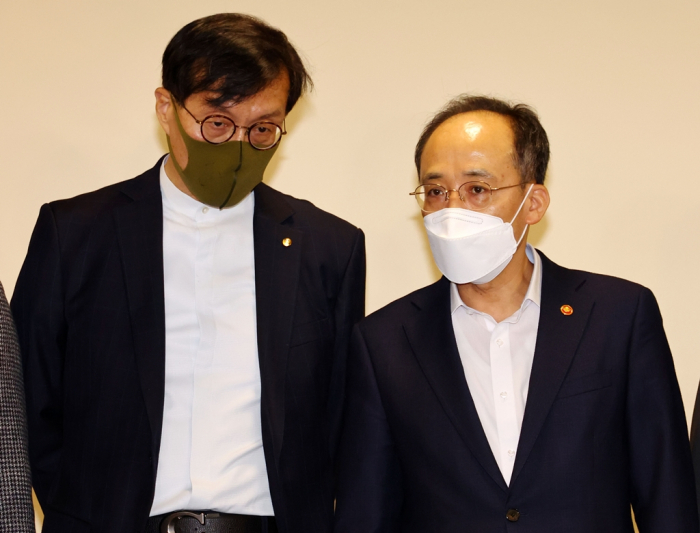Corporate bonds
Korea's $35 bn plan yet to ease Legoland default woes
Default on local govt-back debt for the theme park causes investors to shun bonds, including those of blue chip companies
By Oct 25, 2022 (Gmt+09:00)
4
Min read
Most Read
LG Chem to sell water filter business to Glenwood PE for $692 million


KT&G eyes overseas M&A after rejecting activist fund's offer


Kyobo Life poised to buy Japan’s SBI Group-owned savings bank


StockX in merger talks with Naver’s online reseller Kream


Meritz backs half of ex-manager’s $210 mn hedge fund



South Korea’s $35 billion rescue plan provided a temporary painkiller to the domestic bond markets rattled by Legoland Korea developer’s default, but investors remained concerned about the nation's record short-term corporate debt.
Local bond yields slumped on Monday, a day after the country pledged to inject at least 50 trillion won ($35 billion) to stabilize short-term money and corporate bond markets. The rescue plan included a bond market stabilization fund of 20 trillion won, purchases of corporate bonds and commercial papers (CPs) worth 16 trillion won, and others.
The highly liquid three-year government bond yield fell 19 basis points (bps) to 4.305%, its first decline since Oct. 12, while the 10-year bond slid 12.9 bps to 4.503%. In the corporate bond market, the three-year bond yield with a credit rating of AA- skidded 14.4 bps to 5.592% and the BBB- bond yield dropped 14.5 bps to 11.446%.
Investor sentiment, however, has yet to fully improve as corporate funding conditions are expected to remain under pressure from global interest rate hikes amid stubbornly high inflation, bond market participants said. The yield of 91-day CPs with an A1 rating rose 12 bps to 4.37%, the highest since January 2009 when the global financial crisis hit the country.
“Demand has slightly revived, especially for blue-chip corporate bonds with strong ratings,” said a corporate bond official at a local brokerage house. “But the market can crash again once with other bearish events such the BOK taking another big step with a 50-bp rate increase.”
South Korea’s short-term corporate debt has already logged a record high. Non-financial companies held short-term debts of 532.5 trillion won with maturities of less than one year as of end-June, up 11.4% from the end of 2021, according to data from the Bank of Korea. Among the sum, short-term loans stood at 490.4 trillion won and short-term bonds such as CPs totaled 42.1 trillion won.
DEFAULT ON MUNICIPAL GOVERNMENT-BACKED DEBT
The domestic money market and corporate bond market have been hammered by the default on municipal government-guaranteed debt worth 205 billion won raised to fund the construction of Legoland Korea theme park in Gangwon Province.
Late last month, a special purpose company established by the Gangwon Jungdo Development (GJC) to fund construction of the resort, missed the debt payment. It was then finally listed as bankrupt earlier this month.
That caused investors to shun bonds, including those issued by companies with healthy credit ratings. Hanwha Solutions Corp., LG Uplus Corp. and Hanjin Transportation failed to raise as much money as targeted through bond sales earlier this month.
Lotte Engineering & Construction Co. borrowed 500 billion won from its affiliate Lotte Chemical Corp. for the repayment of short-term debts and other purposes. The financially strong construction unit of Lotte Group plans a rights offering next month to raise 200 billion won.
“The money market was really strained last week,” said a corporate finance executive at a local brokerage. “Companies like Lotte with excellent financial structure had trouble in fundraising. What would happen to others in such a situation?”
Some affiliates of major conglomerates such as Lotte, SK and Hyosung raised money through primary collateralized bond obligations (P-CBOs) of the Korea Credit Guarantee Fund, a fundraising method often used by small- and medium-sized enterprises that have difficulties securing money.

RUSH TO BANKS
Interest rates on corporate loans have been growing as companies rushed to banks due to tighter financial market conditions.
The average borrowing cost on new corporate loans rose to an average of 4.46% per annum in August, the highest since July 2014, according to available central bank data. The rate was estimated to have exceeded 5% this month. The rate has been lower than 5% since February 2013.
Sluggish corporate earnings further deteriorated conditions as the number of companies that missed market expectations for quarterly profits increased.
Samsung Electronics Co., the world’s top memory chipmaker, reported an operating profit of 10.8 trillion won in the third quarter, lower than the consensus profit forecast of 11.9 trillion won, for example. POSCO Holdings Inc., the holding company of the world’s sixth-largest steelmaker, logged an operating profit of 900 billion won, missing market estimates of 1.5 trillion won.
Kukdo Chemical Co. reported 13 billion won in operating profit, less than a third the consensus forecast of 48 billion won.
Write to Ik-Hwan Kim, Mi-Hyun Jo and Hyun-Ju Jang at lovepen@hankyung.com
Jongwoo Cheon edited this article.
More to Read
-
 EarningsPOSCO Holdings' Q3 profit tumbles on steel mill shutdown
EarningsPOSCO Holdings' Q3 profit tumbles on steel mill shutdownOct 19, 2022 (Gmt+09:00)
1 Min read -

Comment 0
LOG IN


